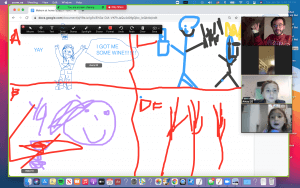What is it that connects us to the stories of the past? In this class’s view it is the emotions, and there were certainly a few to unpack in this story. We’ve continued on with the story of the brothers Yaakov and Eisav with Eisav now having just found out about his blessing having been taken by his brother.
We had deep insight into the emotions of Yaakov and Eisav. We broke down the blessing each of them received. Who had what emotions because of the events of this story? Do we feel like their emotions were justified?
- “I think that Rivkah was thinking about herself a bit too much in this moment”
- “Rivkah doesn’t seem like she likes Yaakov too much because she has to send him away”
We explored the idea of our own emotional thermometers- with “hot” feelings for when we’re stressed, angry, and frustrated and “cold” feelings for when we’re sad, depressed, and feeling blue and in the middle, “calm alert” for when we’re feeling awake, safe, and comfortable. We measured the emotional “temperature” throughout the story. What were some ways that we could put ourselves back to “calm alert” when we’re feeling these emotions?
- “I take some nice deep breaths”
- “ I like to repeat the word “no” to myself as I find it really soothing”
- “ I snuggle with my blanket”
- “I think about good things- going to camp, getting a phone, and other happy things happening in the future”
We took a while to digest the idea of why Eisav says he will wait for his father to die before he goes out and seeks vengeance against his brother.
- “I don’t think he wants Yitzhak to know about it because it will make him even more sad”
- “He doesn’t want his Dad to have more things to worry about”
A lot of respect goes out to our class for what can be a very emotional story. When asked what kind of story this is we all agreed- “drama”.
“Why so much talking about killing in this story?”
“Why would someone do this to their sibling?”

“I think Eisav could be feeling cold feelings at the end of this story, but also a little bit of hot feelings too!”
We broke down the idea of what it might mean for a story to have so much drama. That these are problems we might even encounter today.We won’t spoil it but things work out well in the end, but it doesn’t come without people taking the time they need to figure out feelings. In coming classes, we’ll be looking into even more of these large scale emotions. Emotions are a wonderful connection between us and the characters of the Torah. Building our muscles for empathy is an important part of what drives Torah study at Makom Community. When we take a moment in their shoes we see the problems of now and then are separated only by time. And if they can overcome their challenges, we can too.
